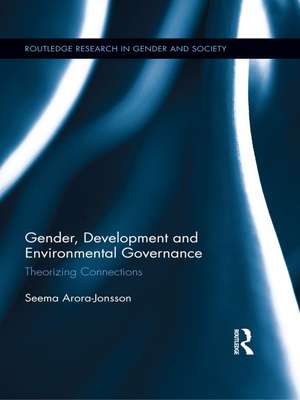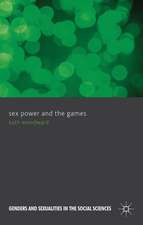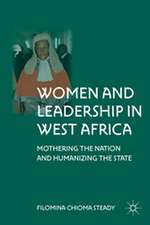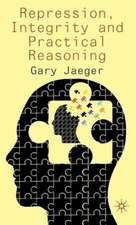Gender, Development and Environmental Governance: Theorizing Connections: Routledge Research in Gender and Society
Autor Seema Arora-Jonssonen Limba Engleză Paperback – 2 iun 2014
Based on participatory research and in-depth fieldwork, Arora-Jonsson studies struggles for local forest management, the making of women’s groups within them and how the women’s groups became a threat to mainstream institutions. Insights from India, consistently ranked as one of the most gender-biased countries, are compared with similar situations in the ostensibly gender-equal Sweden. Arora-Jonsson also analyzes how dominant ideas about the environment, development and gender equality shape the spaces in which women and men take action through global discourses and grassroots activism.
Questioning the conventional belief that development brings about greater gender equality and more efficient environmental management, this volume scrutinizes how environmental imaginations are key to crafting gender relations. It shows gender to be at the heart of environmental negotiations while at the same time making a case for environmental sensibilities as integral to gender relations. At the confluence of development, environmental and gender studies, the book contributes to a much-needed dialogue between these fields, proposing new futures in environmental management.
| Toate formatele și edițiile | Preț | Express |
|---|---|---|
| Paperback (1) | 393.66 lei 3-5 săpt. | +20.05 lei 7-13 zile |
| Taylor & Francis – 2 iun 2014 | 393.66 lei 3-5 săpt. | +20.05 lei 7-13 zile |
| Hardback (1) | 1062.98 lei 6-8 săpt. | |
| Taylor & Francis – 8 aug 2012 | 1062.98 lei 6-8 săpt. |
Din seria Routledge Research in Gender and Society
- 5%
 Preț: 307.44 lei
Preț: 307.44 lei -
 Preț: 148.25 lei
Preț: 148.25 lei -
 Preț: 312.34 lei
Preț: 312.34 lei -
 Preț: 287.20 lei
Preț: 287.20 lei -
 Preț: 287.05 lei
Preț: 287.05 lei - 9%
 Preț: 1037.62 lei
Preț: 1037.62 lei - 23%
 Preț: 853.38 lei
Preț: 853.38 lei - 8%
 Preț: 389.01 lei
Preț: 389.01 lei -
 Preț: 361.84 lei
Preț: 361.84 lei -
 Preț: 311.41 lei
Preț: 311.41 lei -
 Preț: 304.94 lei
Preț: 304.94 lei -
 Preț: 310.22 lei
Preț: 310.22 lei -
 Preț: 310.45 lei
Preț: 310.45 lei -
 Preț: 307.00 lei
Preț: 307.00 lei -
 Preț: 310.41 lei
Preț: 310.41 lei -
 Preț: 385.21 lei
Preț: 385.21 lei -
 Preț: 278.93 lei
Preț: 278.93 lei - 5%
 Preț: 300.55 lei
Preț: 300.55 lei -
 Preț: 483.92 lei
Preț: 483.92 lei - 9%
 Preț: 1106.47 lei
Preț: 1106.47 lei - 28%
 Preț: 821.53 lei
Preț: 821.53 lei -
 Preț: 431.35 lei
Preț: 431.35 lei -
 Preț: 497.20 lei
Preț: 497.20 lei -
 Preț: 488.51 lei
Preț: 488.51 lei - 18%
 Preț: 1057.89 lei
Preț: 1057.89 lei -
 Preț: 355.13 lei
Preț: 355.13 lei - 18%
 Preț: 1001.39 lei
Preț: 1001.39 lei - 18%
 Preț: 1110.77 lei
Preț: 1110.77 lei - 18%
 Preț: 1117.07 lei
Preț: 1117.07 lei - 25%
 Preț: 766.85 lei
Preț: 766.85 lei - 18%
 Preț: 1060.87 lei
Preț: 1060.87 lei - 18%
 Preț: 1057.05 lei
Preț: 1057.05 lei - 18%
 Preț: 1121.81 lei
Preț: 1121.81 lei - 30%
 Preț: 850.91 lei
Preț: 850.91 lei - 18%
 Preț: 1111.16 lei
Preț: 1111.16 lei -
 Preț: 478.71 lei
Preț: 478.71 lei - 18%
 Preț: 1057.09 lei
Preț: 1057.09 lei - 9%
 Preț: 1040.39 lei
Preț: 1040.39 lei - 18%
 Preț: 1112.34 lei
Preț: 1112.34 lei - 15%
 Preț: 699.79 lei
Preț: 699.79 lei - 18%
 Preț: 1163.63 lei
Preț: 1163.63 lei - 18%
 Preț: 1116.02 lei
Preț: 1116.02 lei - 18%
 Preț: 1115.33 lei
Preț: 1115.33 lei
Preț: 393.66 lei
Nou
Puncte Express: 590
Preț estimativ în valută:
75.32€ • 78.93$ • 62.27£
75.32€ • 78.93$ • 62.27£
Carte disponibilă
Livrare economică 21 martie-04 aprilie
Livrare express 07-13 martie pentru 30.04 lei
Preluare comenzi: 021 569.72.76
Specificații
ISBN-13: 9780415629614
ISBN-10: 0415629616
Pagini: 286
Ilustrații: 2 Halftones, black and white; 2 Illustrations, black and white
Dimensiuni: 152 x 229 x 15 mm
Greutate: 0.39 kg
Ediția:1
Editura: Taylor & Francis
Colecția Routledge
Seria Routledge Research in Gender and Society
Locul publicării:Oxford, United Kingdom
ISBN-10: 0415629616
Pagini: 286
Ilustrații: 2 Halftones, black and white; 2 Illustrations, black and white
Dimensiuni: 152 x 229 x 15 mm
Greutate: 0.39 kg
Ediția:1
Editura: Taylor & Francis
Colecția Routledge
Seria Routledge Research in Gender and Society
Locul publicării:Oxford, United Kingdom
Public țintă
Postgraduate and UndergraduateCuprins
1. Introduction: Three Places and a Jigsaw World 2. Crafting New Relations and Theorizing Connections: Gender, Development and Environmental Governance 3. Policy Discourses and Material Places: Forests, Gender and the (Re)making of the Peripheries 4. Environmental Politics on the Ground 5. A Politics of the Possible: Gendered Subjectivities in Collective Organizing 6. Micropolitics of Rural Development and Environmental Governance: Resistance, Maintenance and Outside Intervention 7. Discordant Connections: Discourses on Gender and Grassroots Activism 8. Development Practice and Environmental Governance: Flexible Spaces for Political Action 9. Conclusion: Up-Close in a Jigsaw World: Guideposts from the Present
Recenzii
"With a sizzling intelligence and a passionate commitment to justice Seema Arora-Jonsson uses empirically rich case studies from forest villages in India and Sweden to challenge taken-for-granted understandings of gender, environment and governance and their intersections. This beautifully written and deeply insightful book is a definite must-read for anyone concerned about these issues."
-Louise Fortmann, Professor and Chair, Department of Environmental Science, Policy and Management, and Rudy Grah Chair in Forestry and Sustainable Development, University of California, Berkeley
"In Gender, Development, and Environmental Governance, Seema Arora-Jonsson weaves together insights from field experiences and scholarly writings to provide a compelling account of how women can simultaneously be disadvantaged by, contest, and change development and governance outcomes. This book should be required reading for development professionals and decision makers, and anyone interested in gender and development."
-Arun Agrawal, Professor at the School of Natural Resources & Environment, University of Michigan
"With striking precision Arora-Jonsson explores the gendered practices of development in forest communities in India and Sweden. She listens to the subtle messages of village life and leads her readers into social theory. Arora-Jonsson's creative language keeps the reader in steady excitement. This book will be much welcomed in gender studies as well as in broader fields of environmental governance and local development."
- Erik Westholm, Professor, Swedish University of Agricultural Sciences
The book is rich in detailed qualitative data, collected and reflected upon over almost 20 years... The chapters can be read sperately as they all include a contextualization of the topics to be discussed and a conclusion. This format makes it esepcially adaptable as teaching material.
— Maria E. Fernandez, Agriculture and Human Values
"The book is rich in detailed qualitative data, collected and reflected upon over almost 20 years... The chapters can be read sperately as they all include a contextualization of the topics to be discussed and a conclusion. This format makes it esepcially adaptable as teaching material."— Maria E. Fernandez, Agriculture and Human Values
-Louise Fortmann, Professor and Chair, Department of Environmental Science, Policy and Management, and Rudy Grah Chair in Forestry and Sustainable Development, University of California, Berkeley
"In Gender, Development, and Environmental Governance, Seema Arora-Jonsson weaves together insights from field experiences and scholarly writings to provide a compelling account of how women can simultaneously be disadvantaged by, contest, and change development and governance outcomes. This book should be required reading for development professionals and decision makers, and anyone interested in gender and development."
-Arun Agrawal, Professor at the School of Natural Resources & Environment, University of Michigan
"With striking precision Arora-Jonsson explores the gendered practices of development in forest communities in India and Sweden. She listens to the subtle messages of village life and leads her readers into social theory. Arora-Jonsson's creative language keeps the reader in steady excitement. This book will be much welcomed in gender studies as well as in broader fields of environmental governance and local development."
- Erik Westholm, Professor, Swedish University of Agricultural Sciences
The book is rich in detailed qualitative data, collected and reflected upon over almost 20 years... The chapters can be read sperately as they all include a contextualization of the topics to be discussed and a conclusion. This format makes it esepcially adaptable as teaching material.
— Maria E. Fernandez, Agriculture and Human Values
"The book is rich in detailed qualitative data, collected and reflected upon over almost 20 years... The chapters can be read sperately as they all include a contextualization of the topics to be discussed and a conclusion. This format makes it esepcially adaptable as teaching material."— Maria E. Fernandez, Agriculture and Human Values
Descriere
This book questions the conventional belief that development brings about greater gender equality and better environmental management. Based on participatory research and in-depth fieldwork, Arora-Jonsson studies struggles for local forest management, the making of women’s groups within them and how the women’s groups became a threat to mainstream institutions. Engaging seriously with academic debates on gender, environment and development, this volume contributes to a much-needed dialogue among these fields.























